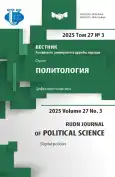Leveraging AI Technologies in Politics: Navigating Threats and Unveiling Opportunities
- Authors: Sokolov A.V.1, Frolov A.A.1, Babajanyan P.A.1
-
Affiliations:
- P.G. Demidov Yaroslavl State University
- Issue: Vol 27, No 3 (2025): Digital policies
- Pages: 622-637
- Section: ARTIFICIAL INTELLEGENCE
- URL: https://journal-vniispk.ru/2313-1438/article/view/348840
- DOI: https://doi.org/10.22363/2313-1438-2025-27-3-622-637
- EDN: https://elibrary.ru/LRRSDH
- ID: 348840
Cite item
Full Text
Abstract
Presently, the rapid evolution of digital technologies that profoundly reshape diverse facets of human endeavor stands as a pivotal theme in both scholarly discourse and practical application. Prominent among these advancements are artificial intelligence (AI henceforth) and neural networks, emerging as indispensable instruments within the realm of politics. The pervasive transformation wrought by integrating AI extends across numerous dimensions of political engagement - spanning strategic design of electoral campaigns through efficient governance mechanisms. Artificial intelligence can provide the opportunity to analyze huge amounts of data and is already being actively used in various countries, opening up new perspectives for understanding social dynamics. In this regard, the article analyzes the main risks and potential of introducing artificial intelligence technologies into the political sphere. The purpose of the study is to identify the main threats and opportunities for the use of artificial intelligence technologies in modern Russian politics. The methods of collecting empirical data were: in-depth interviews of experts (32 experts, representatives of the academic community, IT specialists, government officials, as well as experts in the field of implementation and implementation of digital technologies) from 7 regions of the country, a series of focus groups (5 focus groups) among young people (18-35 years old), average age (36-59 years); senior (retirement) age (60 and over). 10 respondents participated in each focus group. According to the results of the study, the main threats and opportunities for the use of artificial intelligence technologies in the political sphere were identified.
About the authors
Alexander V. Sokolov
P.G. Demidov Yaroslavl State University
Author for correspondence.
Email: alex8119@mail.ru
ORCID iD: 0000-0002-7325-8374
Doctor of Political Sciences, Docent, Head of Socio-Political Theories Department
Yaroslavl, Russian FederationAlexander A. Frolov
P.G. Demidov Yaroslavl State University
Email: a.a.froloff@gmail.com
ORCID iD: 0000-0001-8775-016X
Candidate of Political Sciences, Associate Professor of the Department of Socio-Political Theories
Yaroslavl, Russian FederationPapik A. Babajanyan
P.G. Demidov Yaroslavl State University
Email: babajanyanpapik@yandex.ru
ORCID iD: 0000-0003-2828-5581
research intern
Yaroslavl, Russian FederationReferences
- Ageev, A.I., Zolotareva, O.A., & Zolotarev, V.A. (2022). Russia in the global world of artificial intelligence: assessment by world ratings. Economic strategies, (2), 20–31. (In Russian). http://doi.org/10.33917/es-2.182.2022.20-31; EDN: QAYTDY
- Birgit, S. (2020). Artificial Intelligence and Democratic Politics. Political Insight, 11(1), 32–35. http://doi.org/10.1177/2041905820911746; EDN: ISDTMB
- Bykov, I.A. (2020). Artificial intelligence as a source of political judgments. Journal of Political Research, 4(2), 23–33. (In Russian). http://doi.org/10.12737/2587-6295-2020-23-33; EDN: FCGCZO
- Clauberg, R. (2020). Cyber-physical systems and artificial intelligence: chances and threats to modern economies. World Civilizations, 5 (3–4), 107–115. EDN: GTWIMJ
- Dunleavy, P., Margetts, H. (2023). Data science, artificial intelligence and the third wave of digital era governance. Public Policy and Administration, 40(2), 185–214. https://doi.org/10.1177/09520767231198737; EDN: MLOOYR
- Guskova, A.B., & Kalimullin, N.R. (2020). Modern threats to society with the introduction of artificial intelligence. Actual problems of law and the state in the XXI century, 12(1), 275–281. (In Russian). EDN: PDSIFC
- Izilyaeva, L.O., Vasiliev, Ya.K., Mirokiyants, K.S., & Yasavieva, A.I. (2024). Opportunities and risks of using artificial intelligence in the field of political relations of the Russian Federation. Economics and Management: scientific and practical journal, (1), 136–139. (In Russian). http://doi.org/10.34773/EU.2024.1.24; EDN: CZSMPT
- Kreps, S., & Kriner, D. (2023). How AI Threatens Democracy. Journal of Democracy, 34(4), 122–131. http://doi.org/10.1353/jod.2023.a907693; EDN: LXKFNX
- Pinell, P. (2024). Does Artificial Intelligence Speak Our Language?: A Gadamerian Assessment of Generative Language Models. Political Research Quarterly, 77(3), 713–728. https://doi.org/10.1177/10659129241243038; EDN: FIJAIE
- Ri, M.A. (2024). The evolution of artificial intelligence — real and hypothetical social threats. Sociology and Law, 16(3), 380–390. (In Russian). http://doi.org/10.35854/2219-6242-2024-3-380-390; EDN: LHXCHI
- Seliverstova, A.D. (2024). Opportunities and risks, ethical problems of using artificial intelligence in public administration. Humanities, socio-economic and social sciences, 3, 56–60. (In Russian). http://doi.org/10.23672/SAE.2024.88.31.023; EDN: PWECRW
- Solomonov, E.V. (2023). The concept and features of artificial intelligence. Bulletin of Omsk University. Series: Law, 4(4), 57–65. (In Russian). http://doi.org/10.24147/1990-5173.2023.20(4).57-65; EDN: OAEOBP
- Starke, C, & Lünich, M. (2020). Artificial intelligence for political decision-making in the European Union: Effects on citizens’ perceptions of input, throughput, and output legitimacy. Data & Policy, 2(16), 917–926. http://doi.org/10.1017/dap.2020.19; EDN: PPKCGD
- Turk, Ž. (2024). Regulating artificial intelligence: A technology-independent approach. European View, 23(1), 87–93. https://doi.org/10.1177/17816858241242890; EDN: APMQML
- Volodenkov, S.V. (2024). Neural network algorithms in the actual processes of transformation of traditional worldview and ideological systems. Contours of global transformations: politics, economics, law, 17(2), 6–30. (In Russian). http://doi.org/10.31249/kgt/2024.02.01; EDN: BCFLDQ
- Volodenkov, S.V., Fedorchenko, S.N., & Pechenkin, N.M. (2024). Risks, threats and challenges of the introduction of artificial intelligence and neural network algorithms into the modern system of socio-political communications: based on the materials of an expert study. Bulletin of the Peoples’ Friendship University of Russia. Series: Political Science, 26(2), 406–424. (In Russian). http://doi.org/10.22363/2313-1438-2024-26-2-406-424; EDN: LWSYCV
- Vykhodets, R.S. (2022). Strategy of the USA and Canada in the field of artificial intelligence. USA and Canada: economics, politics, culture, (7), 110–122. (In Russian). http://doi.org/10.31857/S2686673022070094; EDN: GTLHJS
Supplementary files









